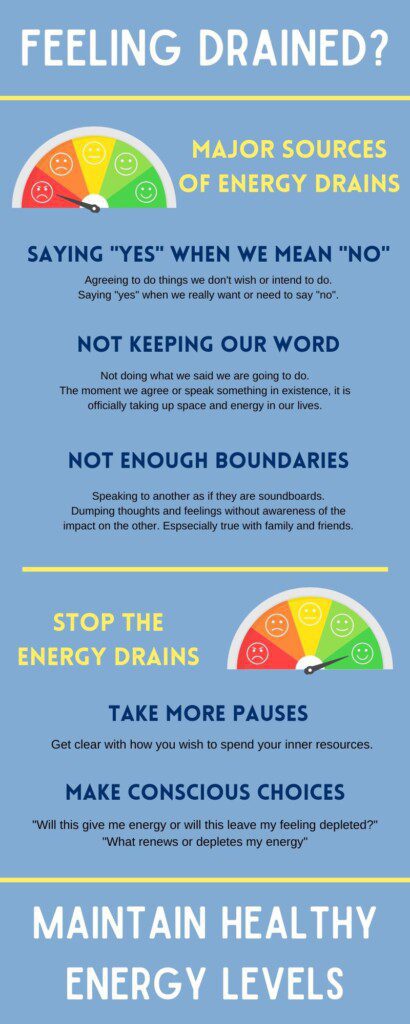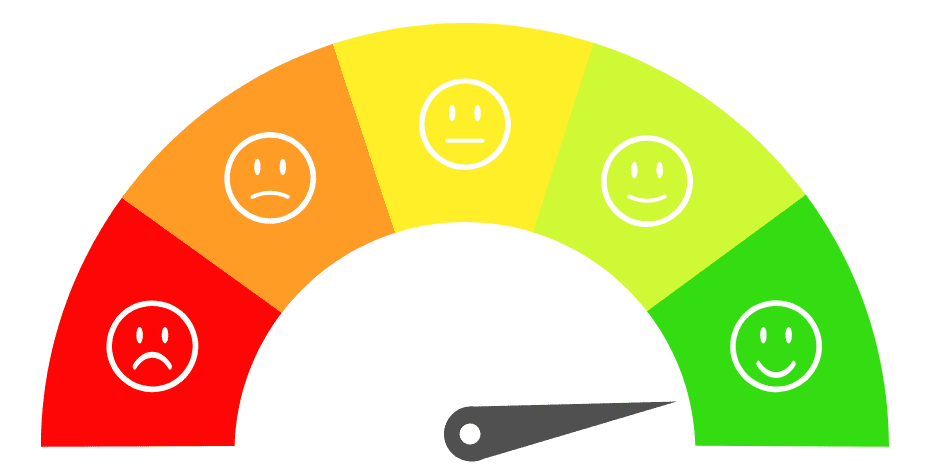Part of choosing a healthy lifestyle is recognizing which behaviors and habits leave us feeling fatigued, or drained. Without even knowing it, many of us participate in actions that end up robbing us of more energy than it’s worth. We don’t maintain healthy energy levels. By noticing how we invest our time and mental resources, we can begin to set firmer boundaries that will ultimately feel supportive, and nourishing. Becoming selective in this way allows us to have more energy to spend on the people, and things we wholeheartedly care about.

Feelings of depletion are easy to sneak up on us when we remain unaware of how we’re choosing to spend our energy in the most basic of interactions. Feelings of anxiousness, frustration, short-temperedness, panic, lethargy, fatigue, are just a few symptoms that would benefit from shifting our vitality expenditure.
Saying “Yes” When We Mean “No”
One major source of exhaustion is commonly found in agreeing to do things that we don’t wish to do – saying yes when we really want to say no. There are countless reasons we do this. From cultivated habits of ‘people pleasing’, to matching our sense of self-worth to how much we ‘do’, to fearing conflict, or not exercising the word no. We end up draining our battery from perpetually bending towards the likes and needs of others, while suppressing our own.
Not Keeping Our Word
We also lose energy from not keeping our word – from not doing what we say we’re going to do. Think about how good it feels the moment you complete an assignment, or follow through on a promise you made to yourself or someone else. This is because the moment we agree or speak something into existence it’s officially taking up space in our lives until it meets it’s finish. By being clear and intentional with when and how we plan on keeping our word, we will more likely not face depletion.
Not Enough Personal Boundaries
Another source of fatigue is often found in the quality of conversations we choose to engage with. It’s all too common for people to speak to one another as if they are soundboards, dumping an excess of information or words onto someone else without any awareness if they are even available to receive them. This is especially true with close friends and family members who may feel comfortable enough to unload an entire stream of thoughts or concerns without hesitation. While this kind of trust and intimacy can be appreciated, it’s important to not become too entangled in the ‘problems’ or ‘complaints’ of others if to honor your own energy reserves. Without this kind of personal boundary, fatigue can set in from spending our time worrying about circumstances completely out of our circle of control.

If you’ve ever ended a conversation feeling completely drained, this is partially why. It’s important to raise our own standards in terms of the conversations we’re choosing to have. By practicing healthy communication skills with one another we become energized from the mutual exchange happening, and we elevate the experience for all people involved.
Pause to Choose
Lastly, we encourage you to take more pauses throughout the day to anchor and to get clear with how you wish to spend your inner resources from one moment to the next. This way we can prevent ourselves from feeling any unnecessary fatigue or exhaustion, living the day feeling energized. When deciding how to effectively move forward, consider asking yourself this question: Will this give me energy or will this leave me feeling depleted? Then you will be maintaining healthy energy levels.
We are all being called to do extraordinary things for the collective caring of our families, communities and the world in response to the unique coronavirus pandemic. Whether home bound or providing critical services, everyone is stretched to adapt like never before. All of us are in this together. Now more than ever, caring is what we need most. Caring for our self. Caring for others around us. Life is going to require new routines, resilience and compassion. We invite you to join us in creating a caring movement to respond to local needs.
Would you like to read more about UCA caring resources and products? We have other blogs on Unified Caring Association and our products, caring in our communities, and caring the UCA way!
By Melissa Aparicio, contributing author


